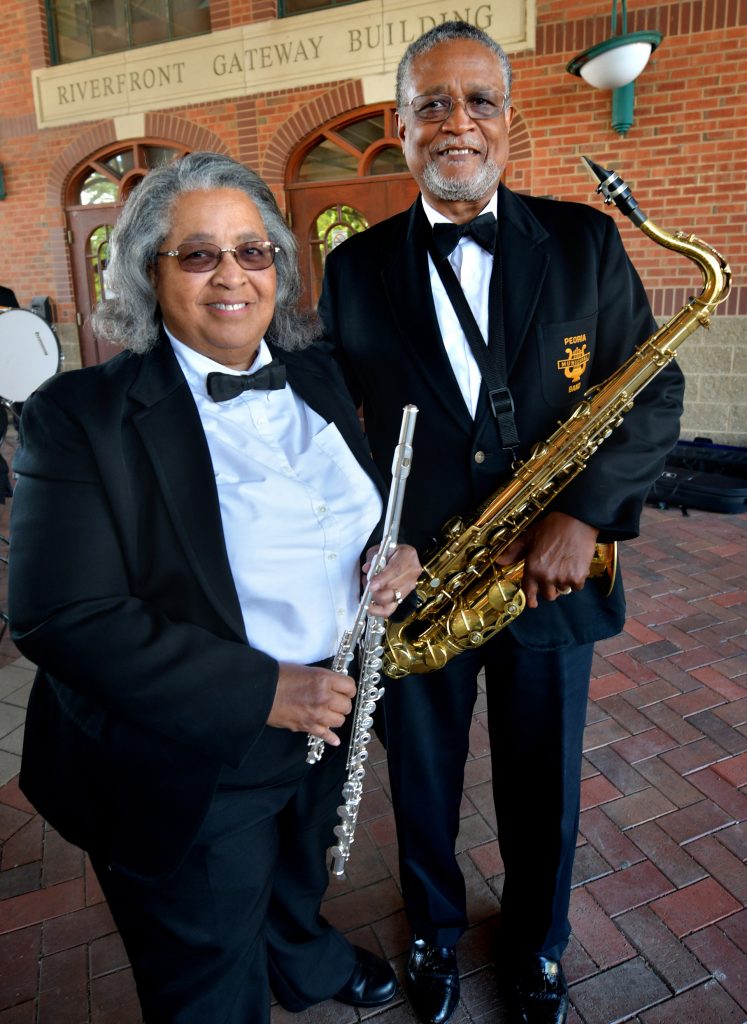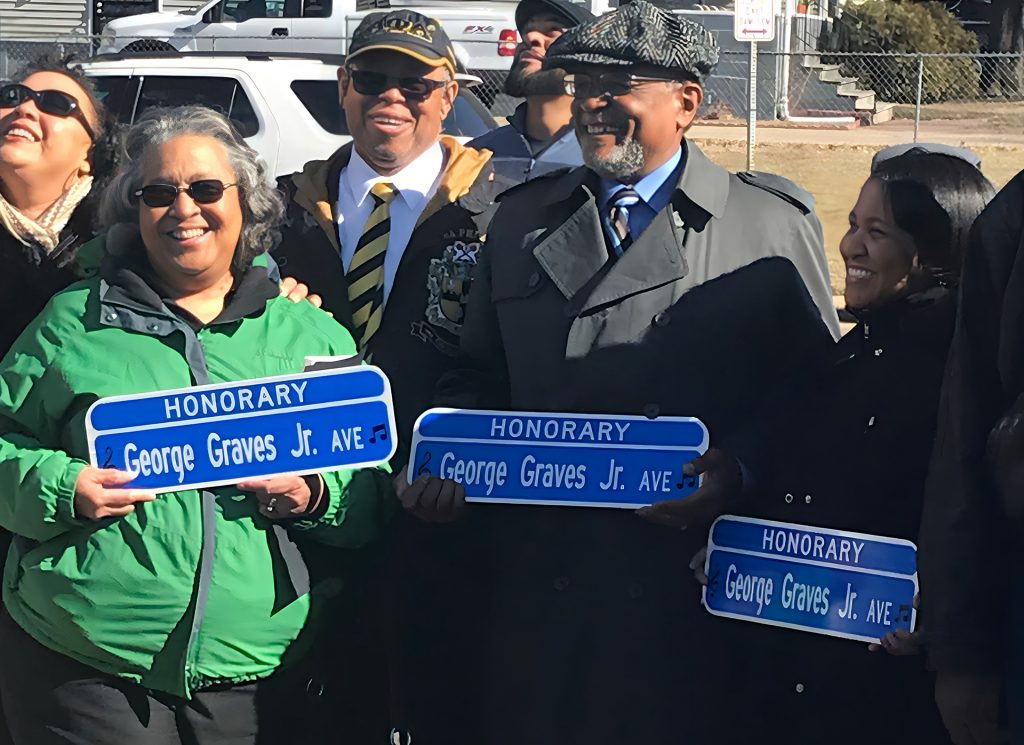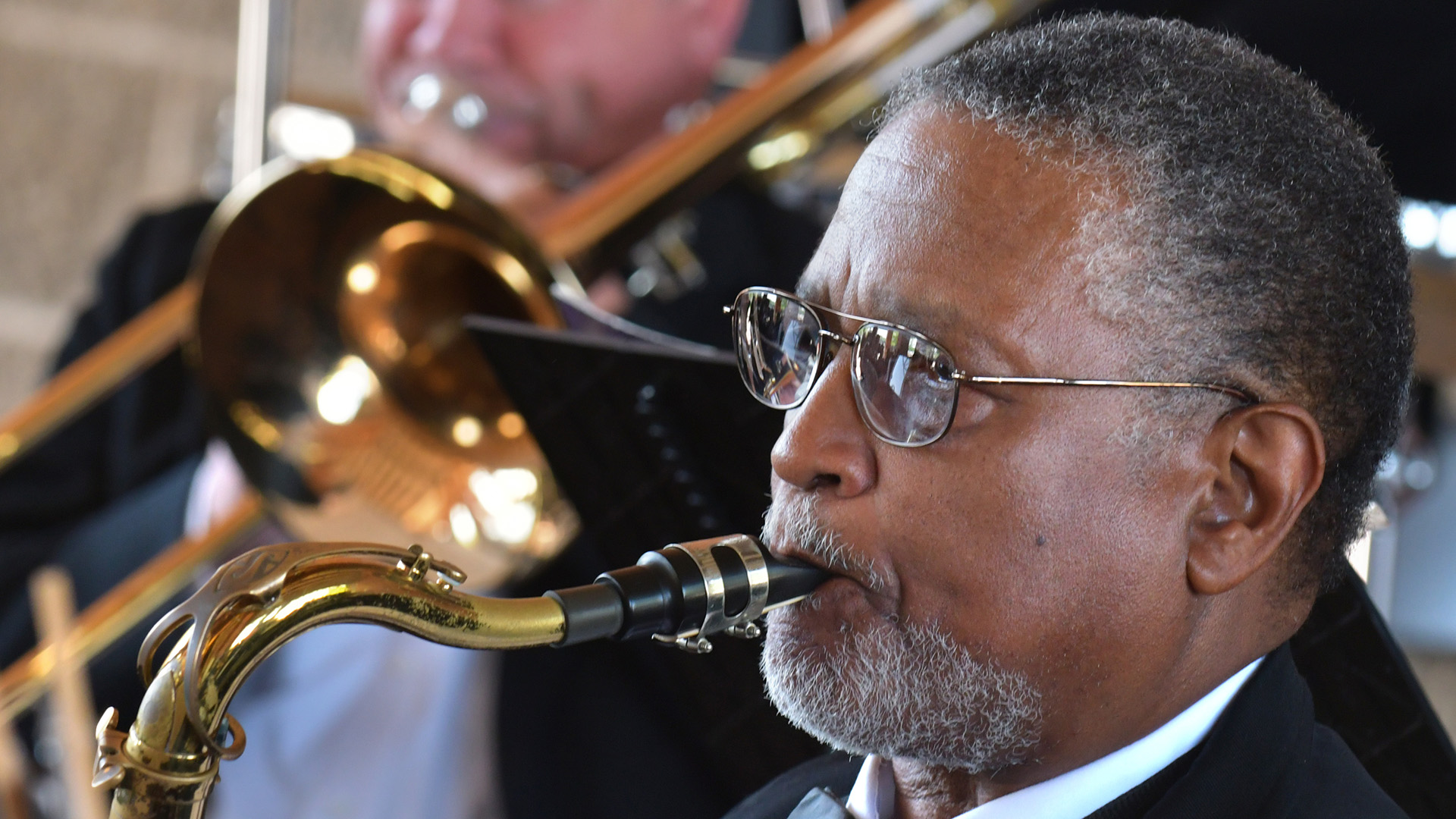Popular names like Dizzy, Cannonball, Bird and several others have been given to famous jazz musicians. Some former students of local musician George Graves coined names for him, as well: Peoria’s Music Man, Hidden Treasure and Legend.

Donald Glover’s memories go way back to when he was a kid watching Graves directing the Manual High School band at the Santa Claus Parade in downtown Peoria.
“I heard Manual’s percussion section,” said Glover, who now teaches inmates at Logan Correctional Center in Lincoln. “They had such a nice cadence that I started dancing to it. When I went home, I decided to emulate that. I had an oatmeal box with a string through it and I wrapped it around my neck and I tried to be a Manual drummer.”
That experience earned Glover a drum set for Christmas and later drum lessons from a percussionist recommended by Graves. When Glover arrived at Manual a year later, he headed straight for band class, where he spent four years under Graves, the school’s band director from 1977 to 2008.
Glover vividly remembers a stern warning the band instructor gave to students on that first day of school.
“He walked in and he gave a speech about being serious about music, and said, ‘If you are not, then get your things and go. This is not a study hall,’” recalled Glover, who has written a book — The Kid and the Keepers: Dream Visions, about a trumpet-playing boy — for which Graves was something of an inspiration.
Former student Nikisha Anderson, now a student advisor at Illinois Central College, said professionalism and discipline were the models in Graves’ band class.
“He always had his saying, ‘To be early is to be on time, and to be on time is to be late,’” she said.
Graves’ commitment to his students and to Peoria’s South Side earned him a rare reward earlier this year. In February, a part of South Griswold Street that runs in front of Manual Academy became Honorary George Graves Jr. Avenue. Meanwhile, Manual also has created the George Graves Jr. School of Cultural Arts, the new label over the school’s auditorium, band room and music offices.
Raising the bar
When Graves arrived at Manual High in 1977, he had high expectations for the band program.
“I just tried to instill in them the importance of playing an instrument and making music a part of their life,” said Graves, a native Peorian who traces his own interests in the subject to the age of 7, when he began playing the saxophone.
It was important to elevate the standards of the program, he said, despite the fact that many students were quitting music programs before they reached high school.
That was Graves’ experience early on with the band program. He said there were other factors outside of school which may have led to the inconsistency with student participation.
“Kids on the South Side, their parents had different priorities with what they did with their money,” he said. “If they started as a beginner, very few kids would rent an instrument.”
Graves often went to Manual’s feeder schools to recruit future band students for the high school program. There were close to 80 students in the band program when he became director, “but that was not 80 kids who could play,” he said.
Graves’ overhaul of the band program included changing grading practices. “If you got an ‘A’ in band, the ‘A’ ought to reflect and show that you know something, not just the fact that you were loyal and came to all of the performances,” he stressed. “You are supposed to come to the performances just like you are supposed to go to work.”
Students were required to learn how to read music, play 15 scales instead of one, perform the Star-Spangled Banner and the school song, and learn music literature from beginning levels to advanced. He believed strongly that students should be able to read music rather than just play by ear.
It was important to erase stereotypes or misperceptions people may have had about Manual High School only being known for athletic achievements, Graves insisted.
“When it came to the music end of it, I made it my business to make sure that nobody ever looked down on Manual and said that they couldn’t play,” Graves recalled. “You mention high school band and people think more about the public performances at basketball or football games. There’s more to band than learning songs for game performances.”
Establishing fundamental structure did not come quickly or easily at Manual, especially during those first few years. Graves said he was not taken seriously by all of the students.
“When the bell rings, it’s time for class to start. You never would have thought that because they were talking clear across the room. You thought you were looking at a Hollywood movie,” he said. “I picked up a music stand and threw it across the floor. Then they all shut up.”

Tough love
The changes and growing pains cost Graves some band students during those formative years.
“One of the trombone players got mad and said, ‘I think this is just a bunch of (blankety, blank). I quit,” he recalled, laughing. “It wasn’t so bad when he got up and walked out, but he took three other trombone players with him.”
Retired Manual English teacher Sharon Crews said Graves took over the band program during a tough transition period. “As a faculty member at the time, I remember the disappointment we all felt, realizing that the end of an era had come and that Manual’s band had become an embarrassment to the school,” she said.
Graves set out to turn that around, establishing rules that made it abundantly clear that he was serious about his craft.
Reuben Cummings, now a software developer in Peoria, described his former teacher as tough and serious but fair.
“He didn’t take any crap,” said Cummings. “It wasn’t a class where you just played around. He brought his perspective to the kind of music we played. It wasn’t like we played random selections.”
Cummings played clarinet at Manual in the late 1990s. He remembered performing a song by legendary composer and bandleader John Philip Sousa during a game performance. He said Graves was a stickler for details, especially when it involved uniforms.
“The main thing was, you had to have black socks,” he recalled. “If you happened to forget your socks, there was the infamous box of old left-over socks that you had to pick from.”
Some of Graves’ students followed in his footsteps, either into musical careers or teaching.
Tim Kelley would go on to help write and produce the R&B hit the Thong Song, which was recorded by Sisqo of Dru Hill.
Amy Nash Jones teaches music in Illinois Valley Central schools. “He had a passion for all types of music and exposed us to different types — marching, Broadway, jazz and classical,” she said. “He challenged students to do their best in everything.”
Winning over the community
“We marched the South Side of Peoria during first period up and down Ligonier and Proctor Streets,” said Glover, who remembered rankling some nearby residents who wanted quiet that early in the morning. Eventually, the tide turned in favor of the band. Residents nodded and waved during those morning drills in what seemed to be a show of approval and pride. During Glover’s time, the band’s numbers jumped to nearly 150 students.
Glover recalled an incident during his sophomore year when he was excited about being asked to dress for the varsity football game one night. “Mr. Graves showed up in the locker room and asked the head football coach, ‘Do you really need Glover? I am short a percussionist. I need a snare drummer.’ The coach said ‘no,’” Glover recalled.
Graves reached out to parents of his students to gain more support. He started the Manual High School Band Parent Organization. The group spearheaded the fundraising money for trips to Disney World and Mardi Gras in New Orleans, where the band marched in parades.
“It took me a while, but I realized that I couldn’t do it all,” said Graves.
A Family Affair
Graves, now 72, shares his passion for music with his wife, Martha, and two adult children, Erica Hoerdemann, a nurse, and Darren, who works in Peoria’s Public Works Department.
Martha also is a retired teacher and musician. The couple and their daughter are members of the Peoria Municipal Band, with which Graves has been involved for 50 years. His wife has him beat, at 54 years.
“We play all the time and our daughter plays all the time,” she said.
Meanwhile, Graves is a charter member of the Prairie Wind Ensemble and performs with the Central Illinois Jazz Orchestra. In 1991, the Prairie Wind Ensemble toured Germany and Italy. In 2003, the Central Illinois Jazz Orchestra performed in Paris and also with the famous Montreux Jazz Festival in Switzerland. Sometimes he performs with the Peoria Symphony, Corn Stock theatre and Peoria Players.
Graves somehow finds time to drive a bus for Peoria Charter Coach, but all in all, over many decades, his life has been devoted to performing and teaching. The Music Man, indeed.





